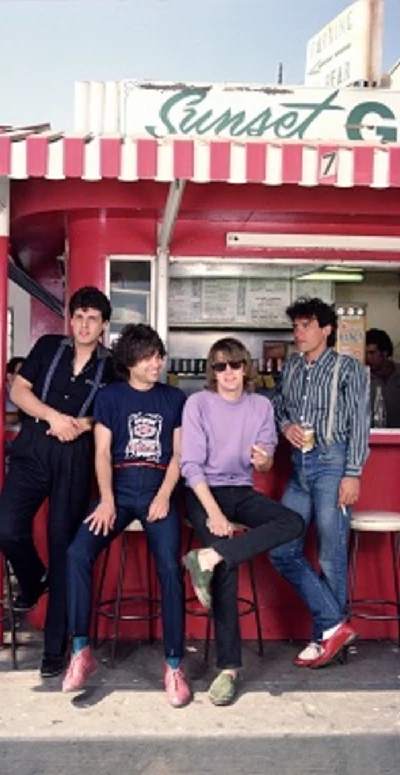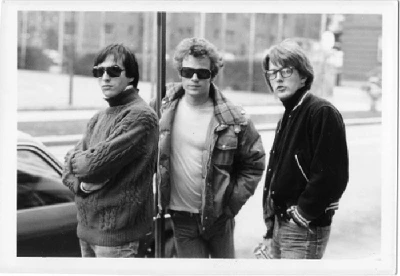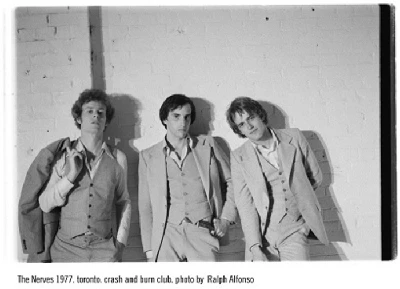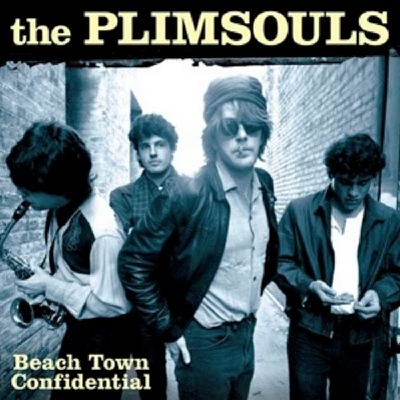Peter Case
-
Interview with Peter Case
published: 23 /
6 /
2012
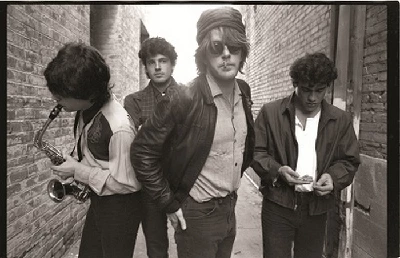
John Clarkson chats to singer-songwriter Peter Case about his 70's and 80's new wave bands the Nerves and the Plimsouls, who have been attracting increasing attention
Article
Peter Case is a Los Angeles-based singer-songwriter, and the veteran of eleven solo studio albums.
While he was nominated for a Grammy in the Best Traditional Folk Album category for his 2007 album ‘Let Us Now Praise Sleepy John’, Case has been attracting attention in recent times for his early bands the Nerves and the Plimsouls, both of which, while largely unheard in their original lifetime, have drawn an extensive late resurgence of interest.
Case, who was born in Buffalo in New York State in 1954 and raised in the nearby town of Hamburg, dropped out of high school and spent his late teens travelling across the United States before settling in San Francisco, where he tried initially to carve out a career for himself as a street musician.
He formed the Nerves, in which he played bass, in 1974, with guitarist Paul Collins and drummer Jack Lee. All three shared vocals and songwriting duties. The Nerves were to prove massively influential on bands such as the Knack and Cheap Trick, combining their snappy vocal harmonies and sharp, jangling riffs with the then fledgling punk/new wave sound.
Despite rebasing themselves in Los Angeles, the Nerves’ own career, however, was short-lived. They released just one record in their lifetime, a self-titled four song EP, on indie label Bomp! Records. Its lead track, ‘Hanging on the Telephone’, would become a massive hit for Blondie in late 1978. The Nerves, with Case and Collins moving in a different musical direction from Lee, had, however, a few months before split up.
Case and Collins briefly played together in another band the Breakways, but that broke up too, and, Case later on in 1978 formed the Plimsouls , which he both fronted and played guitar, with guitarist Eddie Muñoz, bassist Dave Pahoa and drummer Louie Ramírez.
The super-melodic, exuberant Plimsouls put out two albums, ‘The Plimsouls’ (Big Beat Records, 1981) and ‘Everywhere At Once’ (Geffen Records, 1983). They also appeared as themselves in a night club scene in the 1983 early Nicolas Cage film, ‘Valley Girl’ and one of the songs they played in it, ‘A Million Miles Away’, became a minor hit. By the time of the film’s release, with Case shortly afterwards beginning his solo career, the Pliimsouls had already split.
They reunited over a decade later in 1995, with Clem Burke from Blondie taking over Louie Ramírez’s place on drums, and released a little-heard third album, ‘Kool Trash’, in 1998 on Shaky City Records before parting company again later that year. There have since then been two more brief reunions in 2005 and 2007.
The Californian garage rock label Alive Naturalsound released in 2008 ‘One Way Ticket’, a Nerves compilation which as well as the four songs from the EP also contains previously rare demo and live tracks. Alive Naturalsound has since then gone on to release a Breakaways retrospective, ‘Walking Out On Love’, and two Plimsouls live albums, ‘Live ! Beg, Borrow & Soul: October 31, 1981 Whisky A Go Go’ and ‘Beach Town Confidentional’. The latter album was recorded in 1983 at the Golden Bear club in the Californian city of Huntingdon Beach, which runs parallel to Los Angeles, and was released earlier this year
“I tell people now I play folk-rock, and they seem to understand ,” Peter Case says on his website about his solo career “...But the whole truth is more complex: I'm a singer/ songwriter that uses all the American styles to get my stories across : Blues. Rock ‘n’ Roll. Country. Soul. R&B ...and folk..plus some rhythmic influences from around the world. I'm trying to forge my own style out of those inherited materials.” He is also currently writing his autobiography, As Far As You Can Get Without a Passport’, parts of which have been published before both online on his blog and in print.
Pennyblackmusic spoke to Peter Case about his solo career, the Nerves and the Plimsouls, and ‘Beach Town Confidential’.
PB: ‘Beach Town Confidential’ was recorded at the Golden Bear in Huntingdon Beach in 1983, and at a homecoming gig at the end of a West Coast tour. Do you have vivid memories of playing that show or does it just blur amongst the many other shows that the Plimsouls played?
PC: I remember it quite well. I remember that we knew that it was going to be recorded, and , as we were aware of that, we spent the dates before that gearing up so that we knew that we would make a good recording.
As we had been on the road, we were in pretty good form. The Plimsouls was a band that had always had to kind of play over its level to make the right kind of impression (Laughs). We would start out when we were touring by playing gigs around town, and then we would go out on the road and would get stronger and stronger with each date, so that when we came back to town we were more than pretty good.
We brought in a couple of guys who had played on our record as well, my friends the Williams Brothers. They had been on ‘A Million Miles Away’ and on the ‘Everywhere At Once’ album. My friend Andrew Williams was a guitar player and a singer. He was playing with his brother, so we made sure that they were there as well.
PB: One of the things that has been said about the Plimsouls is that they were a better live act than they were a studio act. Would you agree with that?
PC: Yeah, I really would. We never really had a completely comfortable experience in the recording studio. Our records were pretty good, but the band was always in its element live.
PB: The Plimsouls mixed up genres a lot. You have been described as being a combination of Merseybeat, Stax Motown and also having an element of American folk rock. Your prime influence is, however, often seen as being the Who. What was the appeal to you of them?
PC: They were a big influence, but I don’t think they were the prime influence. I loved all the music that you just mentioned, and what I loved about the Who was that whole idea of maximum r ‘n’ b and taking the soul music influence and just exploding it. My favourite record by the Who is their first single, ‘I Can’t Explain’. They were just one of several bands that we were influenced by though.
The Plimsouls weren’t really a retro band. We were trying to put together all our influences and to take them to a new place if we could. We were never one of those bands that dressed like we were in the sixties all the time. There was a flavour of that, but we weren’t trying to go back to that and to recreate something. We were trying to create something new. We were playing music for our time, but at the same time without it exactly being of our time or of old times.
The thing about both the Plimsouls and the Nerves is that those songs sound like they could have been written even now like today. I have just got back from doing a tour with Paul Collins in which we did some of the Nerves material, and in a way those songs could have been written last week. That is the art of the Plimsouls or the Nerves or even what I do as a solo artist. I try to write these songs that deliver in a way that makes them sound fresh, no matter what time they were written in.
PB: The Nerves and the Plimsouls were like the Velvet Underground and the Stooges in that they have grown in stature since they split up. At what point did you realise that there was this growing interest in them both?
PC: It was funny. I was touring as a solo artist about ten years ago, and I went through Chattanooga, Tennessee and there were all these kids there and they wanted to hear Nerves songs. That had never happened before (Laughs), and then it happened again at another gig shortly after that. It was the ninety-nine monkeys thing. It happened in Chattanooga and then it very quickly started happening all over. Shortly after that this guy, John Reis, from the band Rocket from the Crypt, called me up out of the blue. They had just been in Japan, and he said, “I bought this bootleg of your music and I think you guys are the missing link of rock ‘n’ roll.”
A whole new generation of people started picking up on it like that. Nothing was being promoted that made that happen. This was long before Alive Naturalsound started releasing our records. I don’t really know how it happened, or why it happened when it did. I don’t really understand it all to be honest.
PB: There were a lot of the other bands on the LA scene of the time such as X, the Blasters, the Dream Syndicate and the Go-Gos that were all very different from each other, but they also did this thing of fusing styles. How much involvement did you and the Plimsouls have with these other bands?
PC: They were all my friends. I wrote a song, ‘Tonite’, for the first Go-Gos album, ‘Beauty and the Beat’. Dave Alvin and I have been friends since the very beginning of the Blasters. Steve Wynn from the Dream Syndicate was a little younger than me, but I knew him too. There was a gang of bands that were coming up, and we were all playing all the time and you would see everybody everywhere you went.
None of the bands sounded like each other and we weren’t really copying any contemporary model at the time. Everybody was coming up with their own thing. It was really exciting (Laughs). You really felt that maybe like it was going to go somewhere. It was a very inspired period.
PB: The Nerves and the Plimsouls have gone on to be seen as the founders of the power pop movement. Is power pop a phrase that you like?
PC: No, it isn’t. I never liked that phrase. One of the things that I think about a lot of these movements and which is sad about them is that music which was once a kind of emblem for freedom and an escape from conformity is turned into a soundtrack for conservatism.
I see the power pop thing as a very conservative sort of scene. The songs about girls, for example, go back to the way that people looked at relationships between men and women in 1966 or something like that. A lot of it also seems extremely white-led. The Plimsouls, and the Nerves as well, were trying to bring a soul and a black influence into our music.
PB: Were the three other guys from the Plimsouls, Eddie Muñoz, Dave Pahoa and Louie Ramírez, all from a Latin American background?
PC: Louie and Eddie were, and then Dave was Hawaiian. We put a lot of that music as well into the Plimsouls.
PB: You have always played a lot of covers in your music. ‘Beach Town Confidential’ featured covers of songs such as the Creation’s ‘Making Time’, Moby Grape’s ‘Fall On You’ and the Flamin’ Groovies’ ‘Jumpin’ in the Night’. You have also done covers in your solo work like the ‘Peter Case Sings Like Hell’ covers album. What are you looking for when you cover a record? Is there anything that you particularly look for?
PC: I just go by on instinct or intuition. It is just something that I feel that I can really come alive in and take it to a place that I find really exciting. You try things on and see if they stick.
That is how it was with the Plimsouls as well. We did so many different covers of things. We did Marvin Gaye’s ‘One More Heartache’ at one point, Jimmy Reed’s ‘Help Yourself’ and all kinds of stuff. They would come alive inside. We tried other songs, however, and they wouldn’t work as well. We used to do ’25 Miles’ by Edwin Starr. It was just so complicated to play that song and it just wouldn’t stick. I have never really thought about what makes a good cover. We just did stuff we loved, and if the band could do it well we continued with it. I loved playing those songs. I loved playing them as much as I loved my own songs.
PB: The Plimsouls appeared in the Nicolas Cage film ‘Valley Girl’. That film has since then gone on to be a cult hit. What do you remember about making that film? Did it leave an impression on you at the time?
PC: Not really. It was an afternoon’s work. The movie was at that stage still untitled. We didn’t really know what the lowdown was on it. Our manager hooked it up. The people were really nice. Martha Coolidge was the director and she was cool, and our scene involved us playing in a club that we played a lot of times.
Nicolas Cage was still just a kid at the time. He came to one of our rehearsals before we did our part in the film with another guy who was in the movie. They were super nice kids, and were very enthusiastic about us being in the movie.
I didn’t really think anything of it though. It was just a few hours work and then we split. It was one of those things that came and went, and even the movie kind of came and went. It wasn’t a big hit at first. It was a hit way later.
PB: You have been offered other film and acting roles as well. You were offered a part as one of the apostles in ‘The Last Temptation of Christ’.
PC: I was interviewed by Martin Scorsese, who directed the film, for that role. I love his movies, and sat and talked to him for hours about it, and, while there is a part of me that still thinks that I was crazy not to pursue that, I decided not to do it.
I am probably the only person in rock ‘n’ roll that doesn’t see themselves as an actor. What you’re trying to do in rock ‘n’ roll is put yourself across without any self-consciousness. That is what actors do too, but I wouldn’t know how to do it as an actor. It just didn’t ever appeal to me. You’re just kind of a pawn in someone else’s game, and while as a musician you spend a lot of time being a pawn in someone else’s game also (Laughs), I just felt at the time that it was not really what I wanted to do.
I also feel that rock ‘n’ roll never came out good in movies. A lot of musicians do become actors, but they rarely do well in it. Look at Bob Dylan in ‘Don’t Look Back’! The guy in that is like the greatest character in the world in that documentary, but you go and see him in like one of those fucking other movies and it fucking horrible. You go and see him in, say, ‘Pat Garratt and Billy the Kid’, and it is like, “Oh Jesus, is that really Bob Dylan?”
PB: It seemed that in the early eighties the Plimsouls were on the verge of a major breakthrough, but you split up later on in 1983. Why was it that you split? Was it because that breakthrough never came?
PC: We had really high hopes and two different record deals, both on major labels. We had a huge local following and all across California and Texas and Georgia. It was going really well in certain ways, but every time we put a record out it was just like falling off the edge of the world.
At some point in there the morale of the band collapsed. It is hard to keep a band without any real success. I also started to get other ideas. Before I began playing in rock ‘n’ roll bands and joined the Nerves and Plimsouls, I was a street musician in San Francisco and I was writing and playing an acoustic and blues thing, and I started to want to go back to that.
Our second album, ‘Everywhere at Once’, tanked. It was really disappointing for David Geffen and all those other guys at Geffen Records. David Geffen phoned me up one day at my house, and he said, “You are going to sell a lot of records. You are going to be a huge star “. It was like the phone call that everyone wants to get in L.A. I took that phone call a number of times -“This is going to be great. You are going to be a big star and sell millions of these” - and then the record comes out, and you can’t get on the radio at all.
And so I decided to quit the band and to go solo again. I told the other guys, “I am going to leave the band, but if you guys want to get another singer and keep going that is fine.” We knew a guy that could have done it. I offered to continue writing songs for them. There have been a couple of bands where the songwriter has dropped out and still has written the songs. I would have done it, but they weren’t getting along. The whole band had been on the road for five years, and everyone was kind of crazed, and so the group broke up instead.
PB: In light of that why did you decide to reform the band in the mid 90s with Clem Burke from Blondie on drums?
PC: Well, what happened was I had become a folk singer and a solo artist, and I was sitting up there on a stage on Friday night and I was lonely as hell (Laughs). I had a lot of great times on the road. Sometimes you just miss being in a band though.
What I also started to realise was that it a false economy for me to have to choose between being in a band and being solo. Neil Young had his rock ‘n’ roll and his folk music. Everybody did. My generation wasn’t, however, supposed to. I just wanted to play rock ‘n’ roll again. I continued to do my solo records. Probably the best solo record that I ever made was ‘Full Service, No Waiting’ which came out on Vanguard Records in 1998 and right around then I was doing the Plimsouls again. They fed off each other.
The way that the Plimsouls got back together was that we were offered to do a benefit in L.A. I can’t remember for what it was for, but we were all supposed to do Kinks material and Dave Davies was going to be there. We got back together to do this thing and it was a lot of fun.
I was still writing a lot of songs that that could have been Plimsouls songs. Every fifth song or something like could have been done by the Plimsouls, and so we just decided to do it again.
Then Clem came in. I don’t know if he was the best choice for the Plimsouls. He was a great drummer, but really an overwhelming force. He was great though, especially in the recording studio. It was super fun. It was maddening too. You remember fifteen minutes after the band start playing why you broke up. It was really good fun though, and so I did that for a while and then went back solo on road. We have reformed a couple of times since then as well.
PB: Your solo music in recent times seems to have become much more political. Have you always been political or is that a reaction to Bush and post Bush America?
PC: I haven’t always been political, but I was political before the Plimsouls and the Nerves. The Nerves and the Plimsouls weren’t very political. They were just angry about everything.
When I was still living in New York State, I had a band called Pig Nation. That was my big band back then, and they were a political band. The first time that we ever played there was a riot, and there was an editorial against us in the local paper. They actually gave out our address, so that people could come over and kick our asses.
That was the late sixties, and I was political then. I went out marching against the Vietnam War. Then in the early seventies this other thing happened and for some reason the culture went into another place. I can’t say that the whole culture did, but the rock ‘n’ roll culture did.
I wasn’t nearly as political when I was in the Nerves and the Plimsouls. I woke up later on again though about things. Part of that was Bush. I was also no great fan of Bill Clinton. His administration was really corrupt, and then long before then there was Reagan. I was on tour with Jackson Browne in 1986 on his ‘Lives in the Balance’ tour, and he brought me up to speed with the Nicaraguan situation, and so with all these different things I became re-politicised.
I don’t really think I write political music very much. I tend to write songs that are activist and with political statements, which is different. Songs that are political just come and go. If you write one of those things, you have to be very funny. They have just a short shelf life, are very much of the here and now and then they disappear.
PB: You are also working on the third draft of your book, ‘As Far As You Can Get Without a Passport’. You have published parts of it before on your blog and as a book. Is this an extended version?
PC: Yeah, I have got a long version of it now. In fact that is what I have been doing for the last month since I got back from the tour with Paul Collins is working on it. The little book that was published before ended with the Plimsouls and me starting my solo thing. This one will bring things more up to date. It is not really the story of my career. It is not like ‘Diary of a Rock ‘n’ Roll Star’ or anything like that. It has got its own angle which I suppose is more about having an existential crisis and about trying to find your way in the world.
PB: Do you have a publisher?
PC: I have a publisher in Atlanta. He has expressed an interest in it, but he is also interested in finding for me like a major publisher for it. I think that it will be at least another year or so yet before it comes out.
PB: Thank you.
Picture Gallery:-
